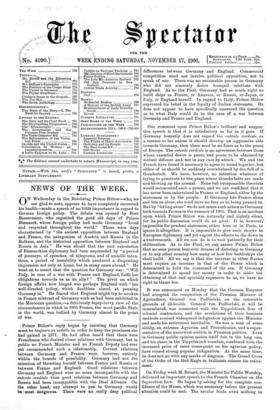I Prince Billow's reply began by insisting that Germany must
be toujours en vedette in order to keep the provinces she hnd gained in 1871. He had often heard that there were Frenchmen who desired closer relations with Germany, but in public no French Minister and no French Deputy had ever yet recommended such a -relationship. Correct relations between Germany and France were, however, entirely within the bounds of possibility. Germany had not the intention of thrusting herself between France and Russia or between France and England. Good relations between Germany and England were no more incompatible with the entente cordiale than good relations between Germany and Russia had been incompatible with the Dual Alliance. On the other hand, any attempt to pen in Germany would be most dangerous.- There were no really deep political
differences between Germany and England. Commercial competition need not involve political opposition, not to speak of war. There was no reasonable person in Germany who did not sincerely desire tranquil relations with England. As to the Fleet, Germany had as much right to build ships as France, or America, or Russia, or Japan, or Italy, or England herself. In regard to Italy, Prince Billow expressed his belief in the loyalty of Italian statesmen. He does not appear to have specifically answered the question as to what Italy would do in the case of a war between Germany and France and England.


























































 Previous page
Previous page